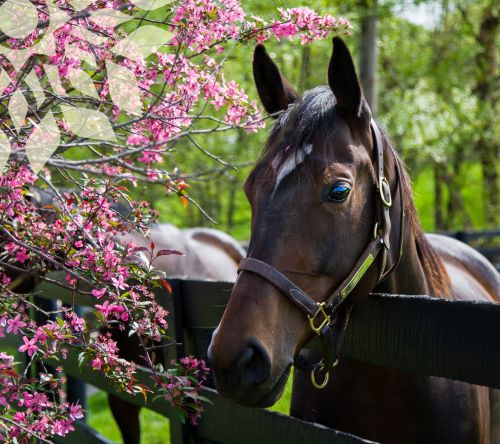Spring is a season many horse owners look forward to – the warmer weather makes for perfect riding conditions, competitions, and pastures grow lush and green again. But for some, spring also brings a sense of dread.
Why? It’s the time of year when many horses experience “spring fever,” a shift in temperament that makes them anxious, nervous, and sometimes unrideable.
“Spring fever” is a term used to describe these behavioural changes in horses at the start of the season. The warmer weather and richer pastures can bring out a horse’s “inner devil,” making them fresh, anxious, nervous, and spooky. Fortunately, with the right management strategies, you can help your horse adjust to the season and stay calm and focused.
What exactly causes this “spring fever”? Let’s take a look at the key factors:
1. Sugar and Fructan-Rich Grasses
As winter fades, grass growth accelerates, and with it comes an increase in simple sugars to fuel the rapid growth. These sugar-packed grasses can lead to higher energy levels in horses, creating what’s often referred to as a “sugar high.”
This boost in sugar, along with a higher proportion of fructans (a sugar fermented in the hindgut), can cause hot, fizzy behaviours in horses.
For horses that are sensitive to sugar or overweight, the increase in sugars can also trigger laminitis, a painful and potentially serious condition.
2. Magnesium Deficiency
Rapidly growing spring grass has a higher content of potassium. Potassium is a mineral salt that is absorbed in the horse’s small intestine for usage or is stored in the body. Potassium competes with other important minerals like calcium, iron, phosphorus, and magnesium for absorption in the horse’s small intestine.
This imbalance, particularly with magnesium, can lead to a deficiency, even if horses appear to be getting enough in their diet.
Magnesium plays a vital role in muscle and nerve function, and when levels are depleted, horses can become anxious, nervous, and display excitable behaviours that are out of character.
Adding a magnesium supplement can help restore balance and calm those overactive nerve impulses, reducing anxiety and reactivity.
When choosing a supplement, it’s important to use one that can be easily absorbed by the horse.
Organic chelate forms of magnesium, for example, are more readily absorbed, bypassing the already overloaded mineral absorption system. Be cautious with magnesium oxide, chloride, or sulfate (Epsom salts), as these forms can disrupt dietary balance.
It’s always best to seek advice when adding supplements to your horse’s diet.
At Bowral Co-op, we offer a wide range of supplements designed to help balance your horse’s diet and calm those springtime jitters. Whether it’s magnesium or other calming aids, we’ve got everything you need to keep your horse happy and rideable during this season of change.
This article was written by a former Bowral Co-op team member with expertise in equine health.
Locally Owned Since 1926: Proudly serving our community with dedication and care.





